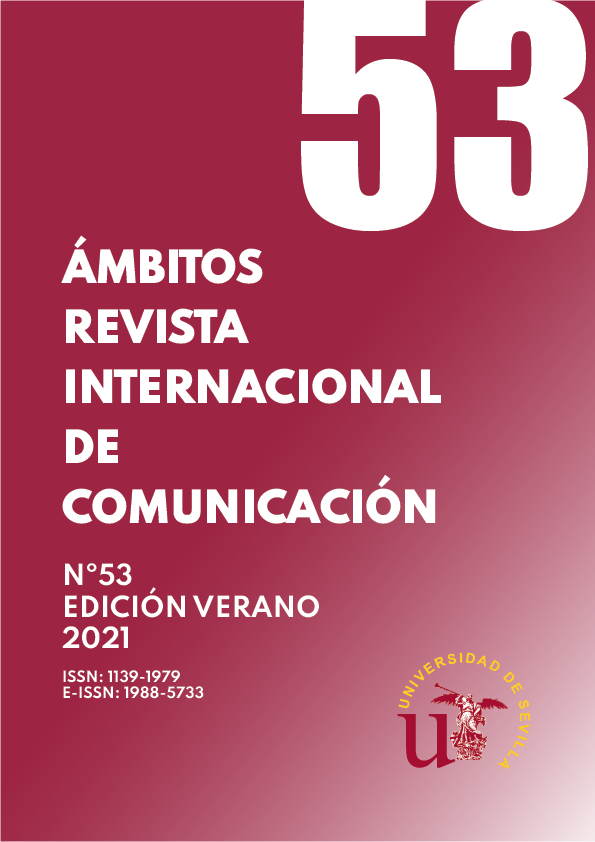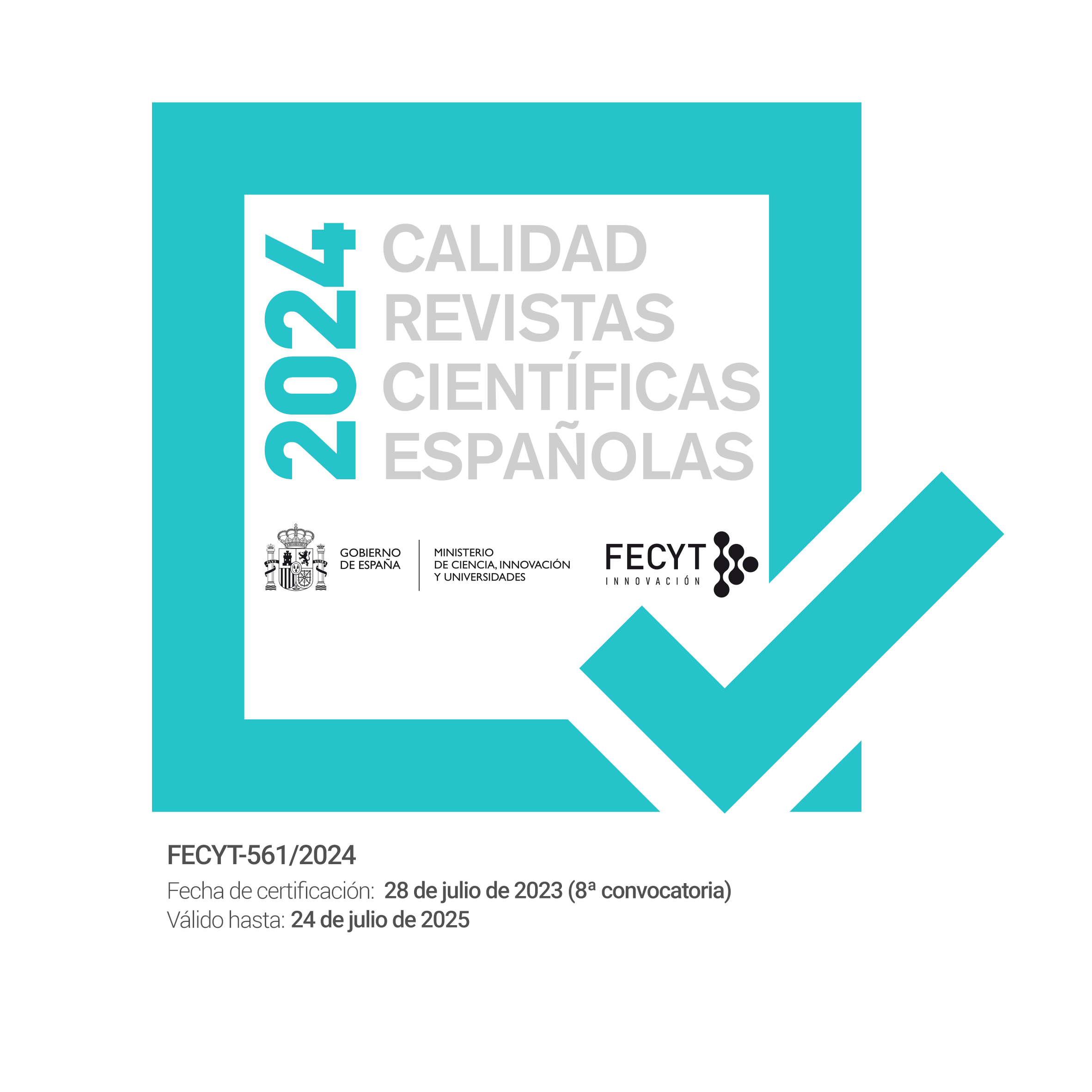The influence of Instagram on the decision to purchase honeymoon tourist destinations
DOI:
https://doi.org/10.12795/Ambitos.2021.i53.06Keywords:
Instagram, Purchase decision, Tourist destination, HoneymoonAbstract
It is increasingly noticeable, the power of influence that social networks have on consumer behavior. In this sense, this study sought to understand how posts on Instagram influence the decision to purchase honeymoon tourist destinations. Also, the following specific objectives were outlined: to identify the types of tourism posts on Instagram that attract the attention of brides; identify the main influencers in the decision-making process for the purchase of tourist honeymoon destinations and propose a framework for the decision-making process for the purchase of honeymoon tourist destinations. Thus, exploratory qualitative research was conducted, conducted by in-depth interviews. Two types of posts were found that must attract the attention of brides: Focus on aesthetics and focus on the tourist structure. Four main types of influencers of honeymoon tourist destinations on Instagram were also identified. It became evident that travel posts on Instagram play a relevant role in the decision to purchase a honeymoon tourist destination, as the users who post act as co-creators of content marketing strategies even without having the intention of this influence. Finally, a framework for the purchase decision process for a honeymoon tourist destination was developed, which showed that Instagram is an essential tool, as the purchase decision process starts there before the trip and at the end is returned to him through posts after or during travel.
Downloads
References
Ait-Bakrim, A., Attouch, H., Guerreiro, M. & Perez-Aranda, J. (2019). Examining the relationship between hoteliers’ review site use intensity and hotel characteristics. Moroccan hotels. Journal of Spatial and Organizational Dynamics, 7(3), 226-239.
Anagnostopoulou, S., Buhalis, D., Kountouri, I., Manousakis, E., & Tsekrekos, A. (2019). The impact of online reputation on hotel profitability. International Journal of Contemporary Hospitality Management, 32(1), 20-39. doiI: 10.1108/IJCHM-03-2019-0247
Arora, A., Bansal, S., Kandpal, C., Aswani, R., & Dwivedi, Y. (2019). Measuring social media influencer index- insights from facebook, Twitter and Instagram. Journal of Retailing and Consumer Services, 49(1), 86-101. doi:10.1016/j.jretconser.2019.03.012
Barasch, A., Zauberman, & G.,Diehl, K. (2018). How the Intention to Share Can Undermine Enjoyment: Photo-Taking Goals and Evaluation of Experiences. Journal of Consumer Research, 44(6), p.1220–1237. doi:10.2139/ssrn.3113448
Bardin, I. (2011). Análise de conteúdo. Edições Setenta.
Blackwell, R., Miniard, P. W., & Engel, J. F. (2008). Comportamento do consumidor. Pioneira Thomson Learning.
Brandt, T., Bendler, J., Neumann, D. (2017). Social media analytics and value creation in urban smart tourism ecosystems. Information & Management, 54, (6), p. 703-713. doi:org/10.1016/j.im.2017.01.004
Creswell, J. W. (2014). Projeto de pesquisa: métodos qualitativo, quantitativo e misto. 3. ed. Penso.
Dantas, B. L. L., & Abreu, N.R. R. (2020). An analysis of the influence of the conspicuous consumption of fast fashion on identity construction on instagram. RAM. Revista de Administração Mackenzie, 21(5), p.1-28. doi:10.1590/1678-6971/eRAMG200043
Fernández, N, I., & García, J. S. (2020). Redes sociales, convergencia y narrativas transmediaen la promoción de las Islas Canarias. Ámbitos. Revista Internacional de Comunicación 48, p. 148-170. doi:10.12795/Ambitos.2020.i48.08
Fontanella, B. J. B., & Júnior, R. M. (2012). Saturação teórica em pesquisas qualitativas: Contribuições psicanalíticas. Psicologia em Estudo, 17 (1), 63-71, doi:10.1590/S1413-73722012000100008
Gao, B., Li, X., Liu, S., & Fang, D. (2018). How power distance aects online hotel ratings: The positive moderating roles of hotel chain and reviewers’ travel experience. Tourism Management, 65(1), 176–186. doi: 10.1016/j.tourman.2017.10.007
Guillet, B. D., Kucukusta, D., & Liu, L. (2016). An examination of social media marketing in China: how do the top 133 hotel brands perform on the top four Chinese social media sites? Journal of Travel & Tourism Marketing, 33(6), 783-805. doi:10.1080/10548408.2015.1064337
Handel, B., & Schwartzstein, J. (2018). Frictions or Mental Gaps: What’s Behind the Information We (Don’t) Use and When Do We Care? Journal of Economic Perspectives, 32(1), p. 155-178. doi: 10.1257/jep.32.1.155
Hlee, S., Lee, H., & Koo, C. (2018). Hospitality and Tourism Online Review Research: A Systematic Analysis and Heuristic-Systematic Model. Sustainability, 10(4), p. 11 - 41. doi:10.3390/su10041141
Jablonska, M. R. (2017). Modern Consumer in Cyberspace: Internet and Psychology Approach. Foundations of Management, 9(1), p. 111-122. doi:10.1515/fman-2017-0009
Jang, H., Lee, S., Lee, S. W., & Hong, S. K. (2007). Expanding the individual choice-sets model to couples’ honeymoon destination selection process. Tourism Management, 28(5), 1299-1314. doi:10.1016/j.tourman.2006.11.008
Lecinski, J. (2011). ZMOT: Conquistando o momento zero da verdade. Google Inc.
Leung, X.Y., Sun, J., & Bai, B. (2019). Thematic Framework of Social Media Research: State of the Art. Tourism Review, 74(3), 517–53. doi:10.1108/TR-05-2018-0058
Lima, L. C., & Arruda, D. M.O. (2019). Las evaluaciones online en la decisión de compra de servicios hoteleros. Estudios y Perspectivas en Turismo, 28(1), 942-961.
Lin, H., Bruning, P. F., & Swarna, H. (2018). Using online opinion leaders to promote the hedonic and utilitarian value of products and services. Business Horizons, 63(5), 458- 482. doi: 10.1016/j.bushor.2018.01.010
Litvin, S. W., Goldsmith, R. E., & Pan, B. (2018). A retrospective view of electronic word-ofmouth in hospitality and tourism management. International Journal of Contemporary Hospitality Management, 30(1), p. 313–325. doi:10.1108/IJCHM-08-2016-0461
Liu, X., Mehraliyev, F., Liu, C., & Schuckert, M. (2019). The roles of social media in tourists’ choices of travel componentes. Tourist Studies, 20(1), 27- 48. doi:10.1177/1468797619873107
Lui, T. W., Bartosiak, M., Piccoli, G., & Sadhya, V. (2018). Online review response strategy and its effects on competitive performance. Tourism Management, v. 67, p. 180-190. doi: 10.1016/j.tourman.2018.01.014
Mowen, J. M., & Minor, M. S. 2006. Comportamento do consumidor. Prentice Hall.
Mukhina, K. D., Rakitin, S. V., & Visheratin, A. A. (2017). Detection of tourists attraction points using Instagram profiles. Procedia Computer Science, 108, p. 2378-238. doi:10.1016/j.procs.2017.05.131
Pires, A. P. (2008). Amostragem e pesquisa qualitativa: Ensaio teórico e metodológico. In: In: Poupart, J. et al. A pesquisa qualitativa: enfoques epistemológicos e metodológicos. Vozes.
Pourfakhimi, S., Duncan. T., & Coetzee. W. (2020). Electronic word of mouth in tourism and hospitality consumer behaviour: state of the art. Tourism Review, 75(4), 637-661. doi:10.1108/TR-01-2019-0019
Prentice, C., Han, X.Y., Hua, L.L., & Hu, L. (2019). The influence of identity-driven customer engagement on purchase intention. Journal of Retailing and Consumer Services. 47, 339–347.
Reyes-Mendez, A., Correia, M.; Matos, N., & Adap, C. (2020). Understanding Online Consumer Behavior and eWOM Strategies for Sustainable Business Management in the Tourism Industry. Sustainability, 12, p. 72-89. doi:10.3390/su12218972
Schiffman, L. G., & Kanuk, L. (2009). Comportamento do consumidor. Rio de Janeiro: LTC – Livros Técnicos e Científicos.
Shafiri, S. (2018). Examining the impacts of positive and negative online consumer reviews on behavioral intentions: Role of need for cognitive closure and satisfaction guarantees. Journal of Hospitality Marketing & Management, p 1-30. doi:10.1080/19368623.2019.1531804
Sharma, H., & Aggarwal, A.G. (2019). What factors determine reviewer credibility? An econometric approach validated through predictive modeling, Kybernetes, 49(10), p. 2547-2567. doi:10.1108/K-08-2019-0537
Sheth, J. N., Mittal, B., & Newman, B. I. (2001). Comportamento do Cliente: Indo além do Comportamento do Consumidor. Editora Atlas.
Sholeh, A. & Rusdi, A., 2019. A New Measurement of Instagram Addiction: Psychometric Properties of The Instagram Addiction Scale (TIAS). Busan, South Korea, s.n., p. 91-97.
Shuqair, S., & Cragg, P. (2017). The Immediate Impact of Instagram Posts on Changing the Viwers’ Perceptions Toward Travel Destinations. Asia Pacific Journal of Advanced Business and Social Studies, 3(2), p.1-12. doi: 10.25275/apjabssv3i2bus1
Silva, M. M., Silva, J. R. H., Marques Junior, S., & Mendes Filho, L. (2020). Comportamento do consumidor e intenção de compra de serviços hoteleiros: influência ao assistir vídeos na internet. Podium Sport Leisure and Tourism Review, 9(2), 286-307. doi:10.5585/podium.v9i2.15905
Solomon, M. R. (2011). O comportamento do consumidor: comprando, possuindo e sendo. Bookman.
Stake, R. E. (2011). Pesquisa Qualitativa: estudando como as coisas funcionam. Artmed.
Tan, H., LV, X., Liu, X., & Gursoy., D. (2018). Evaluation nudge: Effect of evaluation mode of online customer reviews on consumers’ preferences, Tourism Management, 65(1), p 29-40. doi:10.1016/j.tourman.2017.09.011
Tavakoli, R., & Mura, P. (2018). Netnography in tourism – Beyond Web 2.0. Annals of Tourism Research, 73, p. 190-192. doi:10.1016/j.annals.2018.06.002
Ünal, C., Dursun, A., & Caber, M. (2017). A study of domestic honeymoon tourism in Turkey. European Journal of Tourism, Hospitality and Recreation. 8. doi:10.1515/ejthr-2017-0006
Varkaris, E., & Neuhofer, B. (2017). The Influence of Social Media on the Consumers’ Hotel Decision Journey, Journal of Hospitality and Tourism Technology, 8(1), 101-118. doi:10.1108/JHTT-09-2016-0058
Varma, M., Dhakane, N., & Pawar, A. (2020). Evaluation of Impact of Instagram on Customer Preferences: The Significance of Online Marketing. International Journal of Scientific & Technology Research. 9, p.548-554.
Vergara, S. C. (2016). Projetos e relatórios de pesquisa em administração. 16.ed. Atlas.
Xiang, Z., Du, Q., Ma, Y., & Fan, W. (2017). A comparative analysis of major online review platforms: Implications for social media analytics in hospitality and tourism. Tourism Management, 58(1), 51- 65. doi: 10.1016/j.tourman.2016.10.001
Xu, X. (2020). How do consumers in the sharing economy value sharing? Evidence from online reviews. Decision Support Systems, 128, p. 113-162. doi: 10.1016/j.dss.2019.113162
Yilmaz, E. S. (2017). Analyzing the Effects of Comments on Social Networking Sites on Consumer Purchasing Decision Process. International Journal of Academic Research in Business and Social Sciences, 7(6), 140-162. doi:10.6007/IJARBSS/V7-I6/2952
Downloads
Published
How to Cite
Issue
Section
License
Copyright (c) 2021 Lia Chagas de Lima, Nathália de Sousa Pereira, Danielle Miranda de Oliveira Arruda Gomes

This work is licensed under a Creative Commons Attribution-NonCommercial-ShareAlike 4.0 International License.
Ámbitos. Revista Internacional de Comunicación is an open access journal, which means that all content is freely available at no charge to the user or their institution. Users may read, download, copy, distribute, distribute, print, search or link to the full text of articles, or use them for any other lawful purpose, without seeking prior permission from the publisher or author. This definition of open access is in accordance with the Budapest Open Access Initiative (BOAI).

Unless otherwise noted, all content in the electronic edition is distributed under a "Creative Commons Attribution-NonCommercial-ShareAlike 4.0 International License". You can consult the informative version and legal text of the licence here. This should be expressly stated in this way where necessary.
In case of acceptance of the manuscript, the authors cede the rights of the work for its publication to Ámbitos. Revista Internacional de Comunicación under the Attribution-NonCommercial-ShareAlike 4.0 International license contract (CC BY-NC-SA 4.0). The authors retain copyright and third parties are authorised to copy, distribute and make use of the work, provided they comply with the terms and conditions set out in the licence
- Cite the authorship and the original source of publication (journal, publisher and URL of the work).
- Do not use them for commercial purposes.
- If you remix, transform or create from the material, you must release your contributions under the same license as the original.
More information can be found at https://creativecommons.org/licenses/by-nc-sa/4.0/deed.es


















